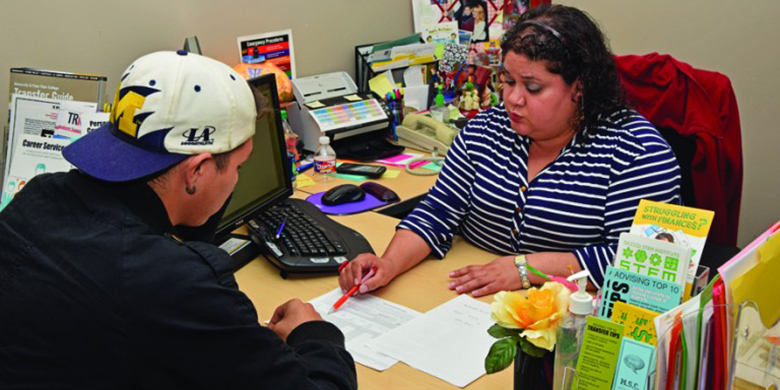Last updated on October 4, 2019
This article originally appeared in the North Lake News-Register and was written by student staff writer Zahra Lokhandwala. The accompanying photo was taken by Joanna Mikolajczak.
While many students keep up with their favorite sports teams and artists or even the Kardashians, they are not aware of what their GPA is and the consequences that come with it when it dips below a 2.0.
Your GPA is something that follows you everywhere you go, throughout your undergraduate years and beyond.
Academic standing is calculated at the end of each semester and when a student’s GPA falls below a 2.0, that student is put on probation.
There are three levels of academic probation. Probation One occurs when students are placed on suspension by failing to maintain at least a C grade in all their classes.
If their GPA is still below a 2.0, it leads to Probation Two, and the students are dismissed and must undergo a one-year sit-out period. If the students still fail to bring their GPAs above a 2.0, then they are put on Probation Three, which leads to indefinite dismissal, meaning the students cannot return.
In addition, students on academic probation have course limitations, must try to repeat classes with F grades to bring up their GPA, must complete workshops and must submit a midterm grade report in order to be eligible for pre-registration.
Students’ GPAs also affect their financial aid.
“You can be on financial aid probation and suspension and not be on academic probation, so it’s two completely different things,” said Jennifer Williams, financial aid adviser at North Lake.
“But the way it affects you here is that if you don’t have a 2.0 GPA and a 67 percent completion ratio, you fall first to a warning. You’re still eligible for financial aid in hopes that you would bring up your GPA and completion ratio to meet with our standard, but if you fail to do it during that semester then next semester you fall into suspension, and in suspension you’re not eligible for financial aid until you’ve met those measures,” said Williams.
There are exceptions made for circumstances where a student is ill or there is a death in their family. These students are encouraged to seek administrative withdrawal, which means late withdrawal. Once ill students submit medical proof to the dean, their grade can be changed to a W, which helps bring their GPA back to normal.
“We do look at each student individually and it’s a case-by-case situation,” said Nadia Rodriguez, an academic adviser at North Lake’s Educational Planning Center. “And that’s not just for exceptions, but for every student that comes in.”
Sometimes students are placed on academic probation not because of academic reasons per se but also because of life circumstances that occur.
“It’s not that they are just bad students,” said Rodriguez. “Things come up that they’re just unable to resolve.”
In order to avoid academic probation, students must maintain at least a C average and keep track of their GPA and all their grades.
“I had a student who was on probation and she went on the Hawaiian field studies and by the end of that trip and end of the study she was off academic probation,” said Rodriguez.
To learn more about scholastic performance and academic standings, log onto www1.dcccd.edu/catalog/ss/sp.cfm.
More Info About Dallas Community Colleges
- Learn more about the financial aid process on our website.
- Find more info about the seven colleges of Dallas Community Colleges, or check out Dallas Colleges Online.
- Apply for admission online in just a few short, easy steps.
